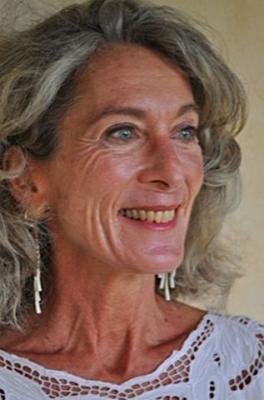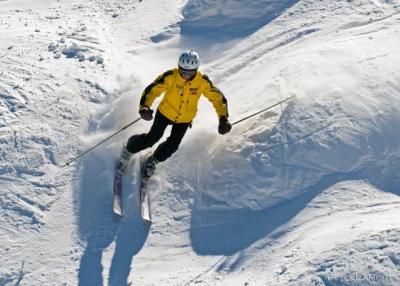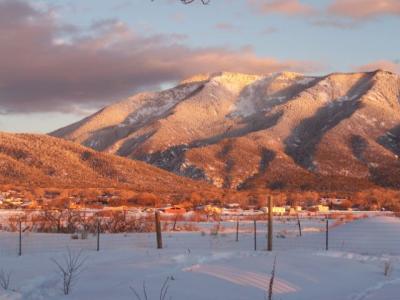MELODY NIXON interviews LESLIE ULLMAN

Leslie Ullman is a fluent, effervescent poet and author of the award-winning collections Slow Work Through Sand, Dreams by No One’s Daughter, and Natural Histories. She teaches poetry – although she considers that all of us, including her students, are “interdisciplinary beings” – at Vermont College of Fine Arts and is professor emerita at University of Texas-El Paso. Melody Nixon saw her read on the last day of 2012 in Montpelier, Vermont. Taken by the lyrical language of her poetry, she invited Ullman into an email dialogue about the light of New Mexico, absence, and the experience of being interviewed.
*
Melody Nixon (MN): Your book Progress on the Subject of Immensity will be released in August 2013. The poems in this book are highly lyrical, invested in the sounds of language and in the rhythm of words, while they also maintain a tight focus on subject. Can you talk about your relationship to rhythm and word sound?
Leslie Ullman (LU): My relationship to sound is so instinctual as to lie at some remove from my conscious grapplings with craft while I’m writing, though it does find a place in my intellect when I’m teaching. I dutifully have read and talked about meter without feeling much excitement beyond the satisfaction of fulfilling an obligation to my students. Other aspects of sound, however, such as the subtle harmonies achieved by repetition or near-repetition of vowel or consonant sounds, have interested me more, especially as they underscore meaning.
MN: Where do you think the sounds in your poetry come from?
LU: I know there is sound-work in my poems, and I wonder if this arises in part from my ongoing experience with physical movement — skiing, dancing, even running. Always, I seek flow and grace in these things, and I achieve it — perhaps as compensation for my lack of hand-eye coordination and of killer instinct in team sports. For me, grace has a lot to do with rhythm, with linking of gestures, with harmony in moving parts. It’s the body in dialogue with its own movements, creating a structure in which variation and repetition intertwine into something that feels good.

MN: Which lyric poets, critics or theorists have inspired your work? I’m thinking of Dylan Thomas and Gerard Manley Hopkins, those wonderful sound-engineers.
LU: The one critical piece I’ve read on sound-work in poems that truly speaks to me is Donald Hall’s essay, “Goatfoot, Milktongue, Twinbird,” in which he explores the psychic origins of sound. He takes us back to the dance of flame of primitive fires, the drumbeats around it, and the soothing, sensual oneness between a mother and her nursing child sitting in its warmth. He talks about an infant’s love of making heavily-voweled nonsense sounds (Milktongue), his pleasure in repeatedly kicking his legs (Goatfoot), and his fascination with his two hands that look just alike but can make separate gestures (Twinbird). All these, Hall says, reveal “the psychic origins of our satisfaction with poetic form.” This essay, which has been around for quite a while, never ceases to reassure and inspire me, helping me trust that we all are hard-wired into something that’s very important to lyric poetry.
MN: You say that when you write poems you’re having a “painterly experience” — could you expand on this? Are you a painter, also?
LU: I don’t paint, though I easily can get lost in paintings, collages, photographs, sometimes sculpture — any work offering images that spark associations in my mind. In college when I began reading poems seriously, I remember being drawn immediately to images that brought to life an enviable receptiveness, a fertile sensibility; in those days I wanted, more than anything, to write poems that demonstrated I, too, had been willing to receive and fully document aspects of lived experience. I don’t mean “confession” here, but “witness” — proof of having been present in the world, rendered in such a way as to make readers feel present as well. This is how others’ poems have affected me — through the action of their images, their minds’ eyes superimposed on my own.
MN: You are from the Chicago area, you live in New Mexico, and you teach in Vermont. What are your favorite kinds of American landscapes?
LU: When I first visited Taos one winter as a teenager, northern New Mexico got its hold on me and never quite let go. Later, living outside El Paso for many years in southern New Mexico allowed me to embrace a softer version of the mountainous terrain, the dry air, and crisp light that originally had drawn me, though I did miss winters. But ultimately, what seems to have put the seal on my bond with both these New Mexico locales is the fact that I have engaged with them very physically, on skis or horseback; I’ve had long, contemplative dialogues with the desert while guiding a horse through arroyos and around mesquite bushes, and I’ve had intense dialogues with snowy mountainsides while hiking off-piste with skis on my back, taking in the silence and the expansive views around me. That sort of absorption and interaction has made deep impressions into every part of me. And I think it both reflects and creates a deep love.

MN: The “dry air and crisp light” you mention, and the mountainous terrain and desert, all seem to have found their way into your poems. There’s the “side / of a canyon whose colors / grow stronger as daylight / finds them” in “Progress on the Subject of Immensity;” the cloud that “is not an O’Keeffe / wash of cotton or a somber grey sponge / but a sheet spread thin by jet stream, / covering the whole sky” in “Cloud.” Have you ever called yourself, or would you consider calling yourself, a nature poet?
LU: That term has become reductive at best, and derogatory at worst, though I don’t think it started out that way. So I would feel confined by it, should it be applied to my work. There are many poets I admire who write about nature, but they’re using nature as a springboard to, or reflection of, other concerns. I think my own work seeks to do that as well; in my case, at least in my most recent book, I seem to be feeling my way through questions that feel too big for me to answer, but I’m aware of making discoveries through the very act of trying to articulate those questions. The poems may be playing at the borders of philosophy, and also exploring the nature of imagination. Thomas Transtromer, for example, has inspired me tremendously in this realm, and he uses a lot of industrial/urban imagery in addition to landscapes.
MN: I was thinking of some contemporary, young poets who refer to themselves as “nature poets.” Perhaps there is a reusing or re-appropriation of an old or outdated term, as you say?
LU: Alas, I think that “nature poetry,” when applied to women, may take on its reductive costume. My impression is that [critics] often find it repetitive in its concerns, even sentimental, which may or may not be fair. Maybe it’s the getting-stuck-in-nature that’s the pitfall.
MN: You deal with presence and absence throughout your latest collection, as you have done in previously published poems. There is a sense of lost identities, and fascination with the process of exploring/imagining them. In “Mind Returns to Find Itself Absent” the narrator “looked into the room which no longer / looked at me. In one of the many lives / I hadn’t lived, city lights blurred the stars…” “Call it Limbo” begins with absence, “This absence,” and the sense of a civilization lost, but ends with birth, “the names of newborns.” Does the theme of absence hold personal meaning for you?
LU: I don’t experience “absence” as negative space, but rather as space to be filled with imagined lives and scenarios. This goes back to what I said earlier about how paintings, for me, have always sparked associative thought. Actual landscapes, including cityscapes, often have the same effect; I find myself projecting myself right into them, imagining what kind of inner as well as outer life I might have if I lived in them.
When I travel either literally or in my imagination into landscapes of the past, especially into foreign landscapes, perhaps the stakes are a little higher. I find myself seeking to project myself into history, to feel myself part of a continuum, and I suspect my experience of being an American raised in a suburb among assimilated people has given me a particular longing for this. So I easily vacate my own world in order to explore vicarious experience elsewhere, and often I feel enlarged by that experience. Then, as in “Mind Returns to Find Itself Absent,” I turn round and re-experience my own environment through the eyes of a stranger, subtracting myself from it and entering it afresh. For me, absence is often linked with, or leads to, reverie, invention, and new forms of presence.
MN: In “Further Progress on the Subject of Immensity” the narrator asks, “how does one lay waste to / absence?… Antithesis of place.” I can relate to internal feelings of absence – of missing, of lack, of nostalgia – but I find it hard to imagine something that is the opposite of an external place. How might a physical place contain or embody an absence?
LU: That’s the very question I was losing myself in that particular poem. But I wasn’t addressing it as a philosophical or metaphysical question. Rather, the speaker is simply trying to reconcile the notion of sky as a huge swathe of nothing — of gasses and light and space that can’t be grasped or measured — with the fact that she is looking at a blue something. And of course there is no resolution to this unless you’re a scientist, and maybe not even then. To me the poem is about a sensation as much as anything else — a confrontation with an ungraspable vastness, even though the object of contemplation has a name and a location.
MN: You titled your last email to me: “Progress on the Subject of Interview.” Email interviews seem to be disembodied conversations – the thoughts of two people written down and passed back and forth without any sense of the other person’s being. What is it like to be the subject of such an interview?
LU: This exchange of ours hasn’t felt disembodied to me at all. I can sense a version of your “being” in your questions, and I tap into mine more deeply as I answer. I’m so accustomed to carrying on extended conversations this way, with my Vermont students, with freelance clients, and with myself as I draft poems and essays, so perhaps this has given me faith in the fact that the very act of typing out my thoughts for a particular reason is a mode of moving myself into new territory. Responding to other writers, and now to you, helps me think with a certain sharpness I wouldn’t experience without the catalyst of a receptive person on the other end.
For me, the dialogue is everything, which perhaps marks me as an extrovert despite my love of being left alone for extended periods. In my actual experience, interaction with something that is not-mind, and not-me, helps my own mind flex itself, expand, and demonstrate that it has some powers I can access by invitation, rather than will.
Leslie Ullman‘s new collection of poems, Progress on the Subject of Immensity, will be released by the University of New Mexico Press in August.
Melody Nixon, a New Zealand-born writer living in New York City, is the Interviews Editor for The Common.
Photography credits: Ski photo – Peter Lamont; headshot – Michele Potter.



